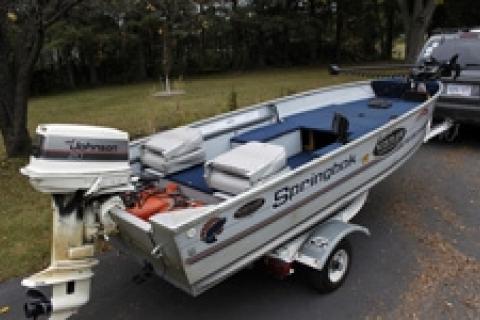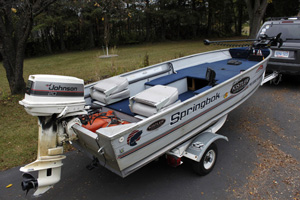
 Pulling a trailered boat or ATV is a fact of life for anglers and hunters. Checking tie downs, lights, and ensuring a secured load is a daily safety check before each of our adventures. For many, however, calculating trailer tongue weight is either absentmindedly or unknowingly left off the check list.
Pulling a trailered boat or ATV is a fact of life for anglers and hunters. Checking tie downs, lights, and ensuring a secured load is a daily safety check before each of our adventures. For many, however, calculating trailer tongue weight is either absentmindedly or unknowingly left off the check list.
Trailer tongue weight is important for a number of reasons. When tongue weight is too heavy, an uncontrolled pushing of the tow vehicle can ensue. Add to this increased drag, strain on the transmission, and elevated fuel costs. If dealing with a tongue weight too light, dangerous swaying of the trailer can occur. Both can create costly errors when traveling down the road.
The recommended trailer tongue weight for boat trailers falls within a range of 5 percent to 7 percent of the total weight of trailer, boat, motor, fuel and gear. Single axel models perform best at 6 percent while dual axel trailers perform best at 5 percent. For trailer campers and other larger rigs, a higher ratio is often used.
The easiest method to calculate your gross weight is by using a municipal weigh scale. If one is not available, tallying up each of the individual items can be done through researching manufacturer sites or digging up your bill of sale.
The use of a bathroom scale — placed at the same height as your hitch — can be used to measure the tongue weight. For heavier boats, a municipal weight scale will again be your best bet.
Example Weight List
| Boat w/Fuel and Battery | 1,200 pounds |
| Motor | 350 pounds |
| Trailer | 700 pounds |
| Total Weight | 2,250 pounds |
| (Total Weight) 2,250 x (Single Axle) 6 percent = 135 pounds (Ideal Weight) |
| 5 - 7 % Range | 112.5 - 157.5 pounds |
Repositioning items within the boat is the easiest method to alter trailer tongue weight. If too light, bring a battery or gear to the front. To reduce weight, shift items to the back. If trailer tongue weight is dangerously high or low after making these adjustments, moving the axel forward or back is the last recourse to fix the problem.
Perform this simple test and see if your tongue weight falls within the safe and recommended zone. Because arriving at the lake and back home without a hitch is always the best case scenario. Happy and safe trails to all!
- 59636 views

